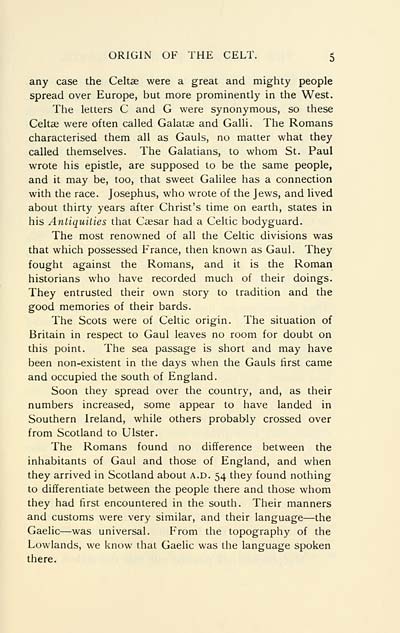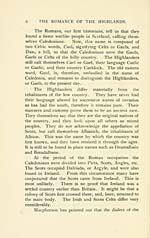Download files
Complete book:
Individual page:
Thumbnail gallery: Grid view | List view

ORIGIN OF THE CELT. 5
any case the Celtae were a great and mighty people
spread over Europe, but more prominently in the West.
The letters C and G were synonymous, so these
Celtse were often called Galatse and Galli. The Romans
characterised them all as Gauls, no matter what they
called themselves. The Galatians, to whom St. Paul
wrote his epistle, are supposed to be the same people,
and it may be, too, that sweet Galilee has a connection
with the race. Josephus, who wrote of the Jews, and lived
about thirty years after Christ's time on earth, states in
his Antiquities that Caesar had a Celtic bodyguard.
The most renowned of all the Celtic divisions was
that which possessed France, then known as Gaul. They
fought against the Romans, and it is the Roman
historians who have recorded much of their doings.
They entrusted their own story to tradition and the
good memories of their bards.
The Scots were of Celtic origin. The situation of
Britain in respect to Gaul leaves no room for doubt on
this point. The sea passage is short and may have
been non-existent in the days when the Gauls first came
and occupied the south of England.
Soon they spread over the country, and, as their
numbers increased, some appear to have landed in
Southern Ireland, while others probably crossed over
from Scotland to Ulster.
The Romans found no difference between the
inhabitants of Gaul and those of England, and when
they arrived in Scotland about a.d. 54 they found nothing
to differentiate between the people there and those whom
they had first encountered in the south. Their manners
and customs were very similar, and their language — the
Gaelic — was universal. From the topography of the
Lowlands, we know that Gaelic was the language spoken
there.
any case the Celtae were a great and mighty people
spread over Europe, but more prominently in the West.
The letters C and G were synonymous, so these
Celtse were often called Galatse and Galli. The Romans
characterised them all as Gauls, no matter what they
called themselves. The Galatians, to whom St. Paul
wrote his epistle, are supposed to be the same people,
and it may be, too, that sweet Galilee has a connection
with the race. Josephus, who wrote of the Jews, and lived
about thirty years after Christ's time on earth, states in
his Antiquities that Caesar had a Celtic bodyguard.
The most renowned of all the Celtic divisions was
that which possessed France, then known as Gaul. They
fought against the Romans, and it is the Roman
historians who have recorded much of their doings.
They entrusted their own story to tradition and the
good memories of their bards.
The Scots were of Celtic origin. The situation of
Britain in respect to Gaul leaves no room for doubt on
this point. The sea passage is short and may have
been non-existent in the days when the Gauls first came
and occupied the south of England.
Soon they spread over the country, and, as their
numbers increased, some appear to have landed in
Southern Ireland, while others probably crossed over
from Scotland to Ulster.
The Romans found no difference between the
inhabitants of Gaul and those of England, and when
they arrived in Scotland about a.d. 54 they found nothing
to differentiate between the people there and those whom
they had first encountered in the south. Their manners
and customs were very similar, and their language — the
Gaelic — was universal. From the topography of the
Lowlands, we know that Gaelic was the language spoken
there.
Set display mode to: Large image | Transcription
Images and transcriptions on this page, including medium image downloads, may be used under the Creative Commons Attribution 4.0 International Licence unless otherwise stated. ![]()
| Early Gaelic Book Collections > Ossian Collection > Romance of the Highlands > (31) |
|---|
| Permanent URL | https://digital.nls.uk/81815997 |
|---|
| Description | Selected books from the Ossian Collection of 327 volumes, originally assembled by J. Norman Methven of Perth. Different editions and translations of James MacPherson's epic poem 'Ossian', some with a map of the 'Kingdom of Connor'. Also secondary material relating to Ossianic poetry and the Ossian controversy. |
|---|
| Description | Selected items from five 'Special and Named Printed Collections'. Includes books in Gaelic and other Celtic languages, works about the Gaels, their languages, literature, culture and history. |
|---|

